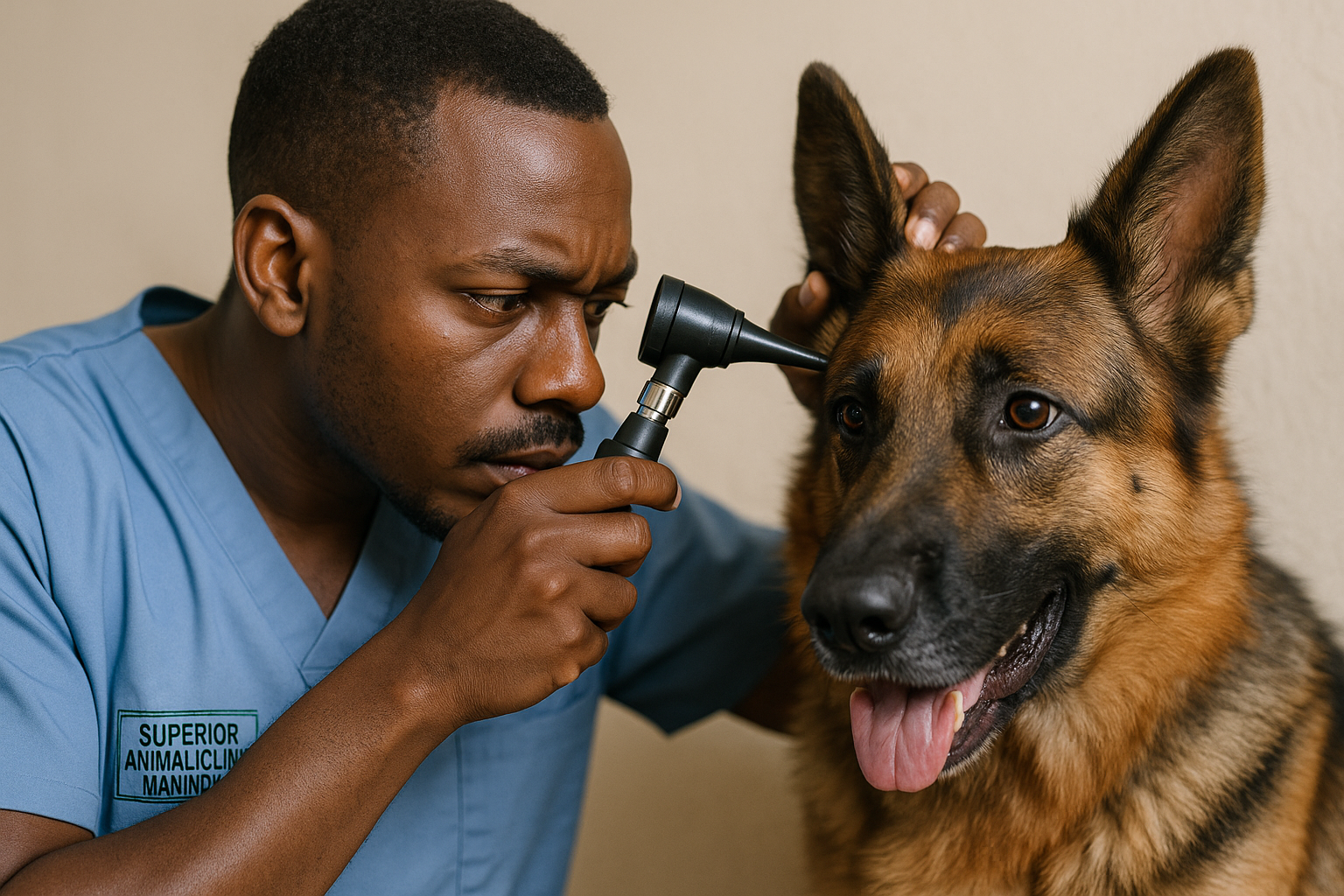
It all started when Bella, a playful German Shepherd from Muyenga, began scratching her ears nonstop. Her owner, Sarah, thought it was just a bit of dirt or wax buildup — after all, Bella loved running through the grass at the playground every evening. But within a few days, Bella’s ear began to smell bad, she kept shaking her head, and the ear looked red, swollen, and painful.
Worried, Sarah searched online for “best vet for dog ear infection in Kampala” and found Superior Animal Clinic, located in Makindye along Salaama Road. When she brought Bella in, our veterinarians gently examined her ear, ran a quick test, and discovered a bacterial ear infection caused by trapped moisture and yeast overgrowth — something very common in Uganda’s warm climate.
After a professional ear cleaning, a prescription of antibiotic and antifungal ear drops, and a short course of medication, Bella was back to her happy, playful self within a week. Sarah couldn’t believe how quickly her dog improved — and she was even more relieved to know how to prevent it from happening again.
Just like Bella, many dogs in Ntinda, Old Kampala, Kasubi, Nsambya, Katwe, Zana, Nakasero, Buziga, Munyonyo, Nakawa, Rubaga, Muyenga, Naguru, Bugolobi, Kabowa, Kabojja, Lugogo, Lubowa, Seguku, Ndejje, Kololo, Mutundwe, Bukoto, Bulindo, and Kulambiro suffer from ear infections caused by dust, mites, allergies, or moisture — but with the right veterinary care, they recover fast.
At Superior Animal Clinic, we specialize in diagnosing, treating, and preventing ear infections in dogs across Kampala. Whether it’s a mild itch or a serious infection, our caring veterinarians use modern equipment, safe medications, and personalized treatment plans to make sure your dog heals completely — and stays healthy.
So if your dog is shaking its head, scratching its ears, or giving off a strange odor, don’t wait — bring them to Superior Animal Clinic, the #1 trusted veterinary clinic for dog ear infection treatment in Kampala, Uganda.
🦻 What Is an Ear Infection in Dogs?
A dog ear infection (also called otitis) happens when bacteria, yeast, or mites infect your dog’s ear canal. It can affect the outer ear (otitis externa), middle ear (otitis media), or inner ear (otitis interna).
Most infections start in the outer ear, and if left untreated, they can spread deeper—causing hearing loss, balance problems, and severe pain.
📍 Common Types of Ear Infections We Treat at Superior Animal Clinic
At Superior Animal Clinic, we commonly diagnose and treat the following types of ear infections in dogs in Uganda:
- Bacterial ear infections – often caused by Staphylococcus and Pseudomonas bacteria.
- Yeast ear infections – usually caused by Malassezia yeast, leading to bad odor and itching.
- Ear mite infestations – tiny parasites that cause severe itching and dark ear discharge.
- Allergic ear infections – linked to food or environmental allergies.
- Chronic ear infections – recurring cases caused by poor ear cleaning, humidity, or underlying disease.
🧫 Common Causes of Dog Ear Infections in Uganda
Just like people can get colds from different things, dogs can develop ear infections for many reasons. In Uganda’s warm, dusty, and often humid climate, these infections are especially common — particularly among dogs that play outdoors or aren’t groomed regularly.
At Superior Animal Clinic in Makindye, Kampala, we’ve treated hundreds of dogs with ear infections, and we’ve learned that while symptoms may look similar, the causes can vary widely. Understanding the cause helps prevent future infections and ensures your dog gets the right treatment from the start.
Here are the most common causes we see among dogs in Kampala and nearby areas like Ntinda, Nsambya, Katwe, Buziga, Munyonyo, Muyenga, Rubaga, Nakasero, and Old Kampala:
1️⃣ Bacteria and Yeast Overgrowth
This is by far the most common cause of ear infections in dogs across Uganda.
Dogs naturally have small amounts of bacteria and yeast in their ears — but when moisture or dirt gets trapped, they multiply rapidly, leading to infection.
- Why it happens: Bathing without drying the ears, swimming, or Kampala’s humid weather.
- Common signs: Bad odor, brown or yellow discharge, redness, and constant scratching.
2️⃣ Ear Mites (Otodectes cynotis)
Tiny, itchy parasites often found in puppies or dogs from shelters and street rescues.
- Why it happens: Close contact with infected dogs or cats.
- Common signs: Black, coffee-ground-like discharge and intense ear scratching.
At Superior Animal Clinic, we use microscopic ear swabs to confirm mite infections and prescribe safe anti-parasitic treatments like ivermectin or selamectin.
3️⃣ Allergies (Food or Environmental)
Just like humans, dogs can develop allergies that affect their skin and ears.
- Food allergies: Triggered by common foods like beef, chicken, dairy, or maize-based kibble.
- Environmental allergies: Dust, pollen, mold, or smoke—especially in urban areas like Katwe, Rubaga, and Makindye.
Allergic dogs often have recurrent ear infections that only improve when the allergy is treated.
4️⃣ Moisture and Poor Ear Hygiene
Moisture creates a perfect breeding ground for bacteria and yeast.
- Dogs with floppy ears (like Cocker Spaniels, Basset Hounds, and Golden Retrievers) trap moisture easily.
- Over-cleaning with harsh solutions can also irritate the ear canal.
At Superior Animal Clinic, we advise using veterinary-approved ear cleaners and drying your dog’s ears after every bath or swim.
5️⃣ Foreign Objects (Grass Seeds, Insects, or Dust)
Dogs that run or play in grassy areas like Buziga, Lubowa, and Mutundwe sometimes get tiny grass seeds or dust lodged in their ears.
This causes irritation, scratching, and eventually infection.
Our veterinarians use an otoscope to check for and gently remove any foreign bodies before starting treatment.
6️⃣ Underlying Skin Conditions
Conditions like seborrhea or hormonal imbalances (hypothyroidism) can make the ear environment oily or flaky, encouraging infection.
These cases require full-body evaluation, not just ear cleaning, which is why professional veterinary diagnosis is so important.
7️⃣ Humidity and Kampala’s Climate
Uganda’s warm, tropical climate means dogs sweat through their paws and ears — not through their skin like humans.
This natural moisture, especially in Kampala’s humid neighborhoods like Nsambya, Munyonyo, and Makindye, makes ear infections much more likely, especially if the dog’s ears are not regularly cleaned and dried.
8️⃣ Ticks and Other External Parasites
Ticks and fleas often crawl into the ears, causing irritation and infection.
These are especially common in outdoor dogs or those not on regular tick prevention.
At Superior Animal Clinic, we offer routine tick and parasite control programs to keep your dog’s ears and skin healthy year-round.
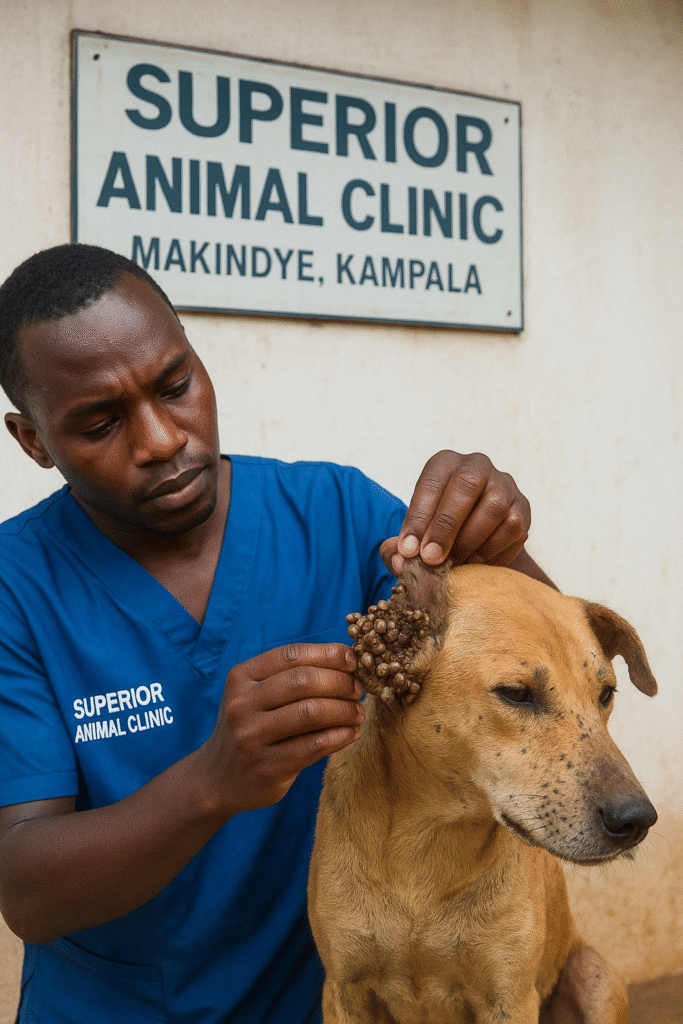
💡 Vet’s Tip from Superior Animal Clinic
“Most dog ear infections in Kampala start small — a little dirt, a bit of moisture, or mild itching. But once bacteria or yeast take hold, it can turn painful fast. Regular cleaning and early veterinary attention prevent most ear problems.”
— Dr. [ Ssonko Ronald], Lead Veterinarian at Superior Animal Clinic, Makindye
🐾 Dog Breeds in Uganda More Prone to Ear Infections — and Why
Just like people, every dog is unique — but when it comes to ear infections, some breeds in Uganda are naturally more prone than others.
Let’s look at the breeds that most often visit our clinic for ear infection treatment — and the reasons why they’re more vulnerable:
🐕 1. Cocker Spaniels
Cocker Spaniels are adorable but have long, floppy ears that trap moisture, dirt, and heat — creating the perfect breeding ground for bacteria and yeast. Because of Uganda’s humid climate, their ears stay damp longer, which makes infections more likely, especially after baths or rain.
Tip: Gently dry your Cocker Spaniel’s ears after bathing or swimming and schedule routine ear cleaning at Superior Animal Clinic.
🐶 2. Labrador Retrievers & Golden Retrievers
These friendly dogs love swimming and playing outdoors. However, water often gets trapped inside their ears, especially since they also have heavy ear flaps. Combine that with Kampala’s warm weather, and you have a recipe for yeast and bacterial ear infections.
Tip: Use an ear-drying solution recommended by your vet after swimming or washing your Retriever.
🦮 3. German Shepherds
German Shepherds are among the most popular dog breeds in Uganda, but they’re prone to chronic ear infections due to underlying allergies and their love for outdoor activity. Dust, pollen, and grass seeds — common in areas like Makindye, Katwe, and Nsambya — can irritate their ears and lead to infections.
Tip: Keep your Shepherd’s ears clean and check for signs of irritation after outdoor walks.
🐩 4. Poodles & Poodle Mixes
Poodles have dense curly hair that grows inside their ear canals, making it hard for air to circulate. This hair traps wax, dirt, and moisture, encouraging bacterial and yeast infections.
Tip: Regular grooming and ear trimming at a professional vet clinic like Superior Animal Clinic can help prevent ear blockages.
🐾 5. Bulldogs & Basset Hounds
Bulldogs and Basset Hounds have narrow ear canals and wrinkled skin folds around their ears, which easily trap bacteria and moisture. Because of this anatomy, infections often return if not treated properly.
Tip: Clean your dog’s ears weekly with a vet-approved cleaner and visit your vet if you notice a bad smell or discharge.
🐕🦺 6. Mixed Breeds (Local Dogs)
Even local Ugandan dogs, especially those living in dusty areas like Katwe, Ndejje, and Kasubi, are not immune. Constant exposure to dust, mites, and poor grooming increases the risk of infection — especially in dogs with floppy or hairy ears.
Tip: Keep your local breed’s ears clean and dry, and bring them in for regular ear check-ups at Superior Animal Clinic to catch infections early.
💡 Why These Breeds Are More at Risk
Dogs become prone to ear infections because of three main factors:
- Ear Structure: Long, floppy, or hairy ears hold moisture and block airflow.
- Allergies: Dogs allergic to food, dust, or pollen have more ear inflammation.
- Lifestyle: Outdoor-loving dogs often collect dirt, water, and parasites that irritate the ears.
The Good News
No matter your dog’s breed, ear infections are completely treatable — especially when detected early. At Superior Animal Clinic, we use professional ear cleaning, safe medication, and breed-specific prevention plans to keep your dog’s ears healthy and infection-free.
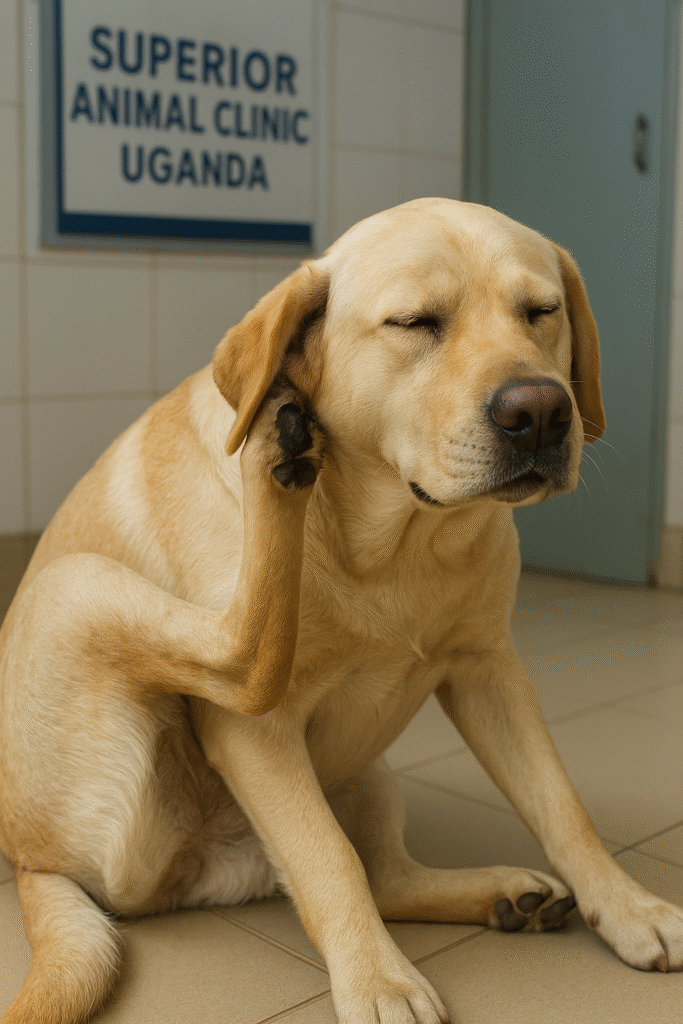
How Ear Infections Are Treated in Uganda at Superior Animal Clinic
At Superior Animal Clinic, located in Makindye along Salaama Road, Kampala, we understand how distressing it is to see your dog in pain — constantly scratching, shaking its head, or crying because of an ear infection. That’s why we’ve developed a step-by-step, professional treatment approach that ensures fast relief, accurate diagnosis, and long-term prevention for your pet.
Here’s exactly how ear infections are treated in Uganda at our clinic:
🩺 Step 1: Detailed Physical and Ear Examination
When you arrive at Superior Animal Clinic, our friendly veterinary team begins by gently examining your dog’s ears — both the outer and inner parts — using a special instrument called an otoscope.
This helps us look deep inside to identify:
- Redness or swelling
- Presence of discharge or pus
- Ear mites, ticks, or foreign bodies (like grass seeds)
- Torn eardrums or chronic infections
If your dog is in pain, we use gentle restraint or mild sedation to make the examination stress-free.
🔬 Step 2: Laboratory Tests for Accurate Diagnosis
To ensure we treat the real cause of your dog’s ear problem, we take a small sample (ear swab) from the affected ear and examine it under a microscope.
This helps us detect:
- Bacteria (like Staphylococcus or Pseudomonas)
- Yeast infections (Malassezia species)
- Ear mites (common in puppies and stray dogs)
In more complicated cases, we can send the sample for culture and sensitivity testing to find out which specific antibiotic or antifungal medication will work best.
Step 3: Professional Ear Cleaning
Before any medication can work effectively, your dog’s ear must be cleaned properly.
At Superior Animal Clinic, we perform a safe and gentle ear cleaning procedure using veterinary-grade ear cleaning solutions designed to remove:
- Wax buildup
- Dirt and debris
- Discharge from infection
We never recommend using human ear cleaners or cotton buds at home — these can push dirt deeper or damage the eardrum.
If your dog has very painful ears, we may sedate them lightly to clean the ears thoroughly and comfortably.
Step 4: Targeted Medication and Treatment Plan
After identifying the exact cause of infection, we prescribe the most effective treatment. Depending on the diagnosis, we may use:
🔹 For Bacterial Ear Infections:
- Antibiotic ear drops such as Gentamicin, Ciprofloxacin, or Enrofloxacin drops
- Oral antibiotics in severe or deep infections
- Pain relief and anti-inflammatory medication to reduce swelling and discomfort
🔹 For Yeast Ear Infections:
- Antifungal ear drops like Miconazole, Clotrimazole, or Ketoconazole
- Ear drying agents to prevent recurrence
- Dietary changes to manage underlying allergies
🔹 For Ear Mite Infestations:
- Anti-parasitic drops or injections (Ivermectin, Selamectin, or Milbemycin)
- Full-body parasite control to prevent re-infestation
- Ear cleaning and follow-up treatments until the mites are completely gone
Every dog’s treatment plan is customized based on severity, breed, age, and overall health.
Step 5: Follow-Up Visits and Monitoring
We schedule a follow-up appointment after 7–10 days to check progress and make sure the infection is completely healed.
This step is important — if not fully treated, ear infections can become chronic or recurrent.
Our veterinarians re-examine the ear, clean it if needed, and may adjust medications or recommend long-term ear care products.
🌿 Step 6: Advice on Home Care and Prevention
At Superior Animal Clinic, we believe prevention is better than cure. After treatment, we guide every dog owner on how to keep their dog’s ears clean and healthy at home.
We show you how to:
- Safely clean your dog’s ears using the right products
- Keep ears dry after swimming or bathing
- Identify early warning signs before infections worsen
- Choose diets that reduce allergy-related ear issues
We also stock veterinary-approved ear cleaners and preventive drops for continued home care.
Your dog’s comfort, health, and happiness always come first at Superior Animal Clinic — the leading veterinary clinic for dog ear infection treatment in Kampala, Uganda.
Best Foods for Dogs with Ear Infections in Uganda
Diet plays a huge role in recovery. At Superior Animal Clinic, we recommend:
- Hypoallergenic dog foods – for dogs with food-related ear allergies.
- Omega-3-rich diets – such as fish or salmon oil to reduce inflammation.
- Balanced diets with vitamins A, C, and E to support skin and immune health.
- Avoid table scraps, dairy, and processed foods that worsen inflammation.
Home Remedies for Dog Ear Infections in Uganda
If you live in Kampala, you already know how dust, heat, and humidity can make dogs more prone to ear infections
While visiting a vet is always the safest option, there are a few gentle home remedies you can try to soothe mild ear discomfort or prevent infections from getting worse before reaching Superior Animal Clinic for professional treatment.
Let’s explore some safe, vet-approved home remedies Ugandan dog owners can use — and when it’s time to stop and call your vet.
1. Coconut Oil (Natural Antibacterial & Antifungal)
Coconut oil is a natural and gentle remedy for dogs with mild ear irritation caused by yeast or bacteria.
It’s widely available in Uganda and affordable for most pet owners.
How to use it:
- Warm a small amount of pure coconut oil (not mixed with fragrance or chemicals).
- Use a clean cotton pad to apply a few drops inside the outer ear flap.
- Massage gently to help it spread.
- Do this once daily for 2–3 days.
Why it helps: Coconut oil fights bacteria and yeast, reduces inflammation, and soothes itching.
⚠️ Avoid pouring large amounts inside the ear canal — use it only for outer ear cleaning.
2. Apple Cider Vinegar (For Cleaning & Odor Control)
Apple cider vinegar (ACV) works as a natural disinfectant that helps reduce odor, itching, and bacterial growth. It’s easy to find in most supermarkets or pharmacies around Kampala.
How to use it:
- Mix equal parts apple cider vinegar and clean boiled water (1:1).
- Dip a cotton pad into the mixture and gently wipe the outer part of the ear.
- Use it only when there are no open wounds or bleeding inside the ear.
Why it helps: ACV balances the ear’s pH level, discourages yeast and bacteria, and keeps the ear canal clean.
⚠️ Never use on dogs with painful or swollen ears — it can sting.
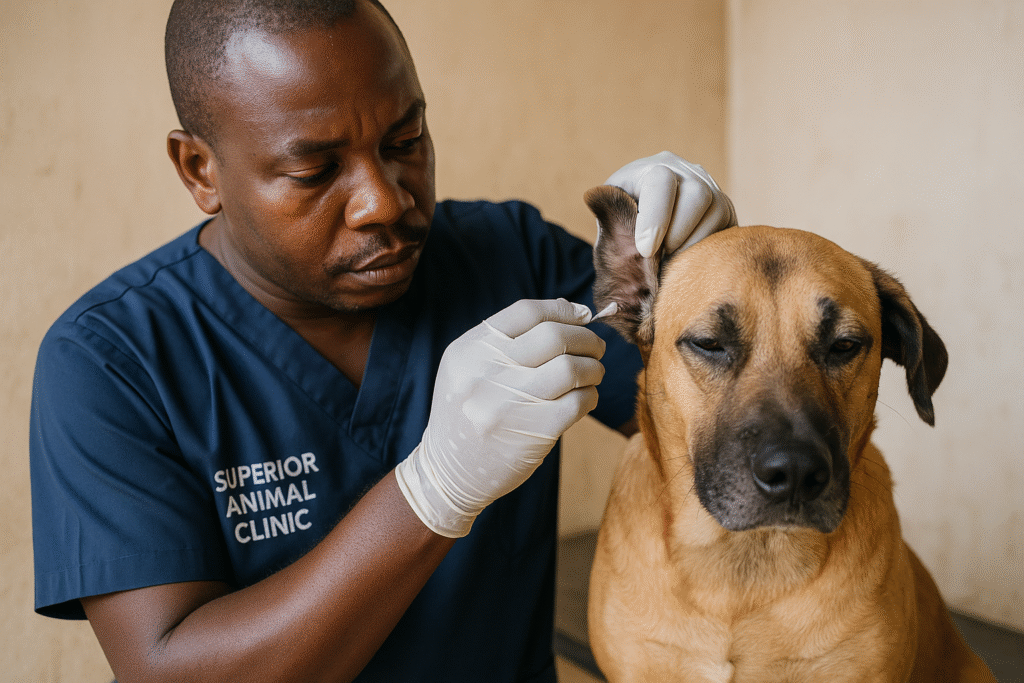
3. Warm Saline Solution (Simple & Safe Cleaning Option)
A saline rinse is one of the safest home remedies to clean out dust, mild debris, or dirt — especially for dogs that spend time outdoors in dusty Kampala neighborhoods like Katwe, Nsambya, Kasubi, and Mutundwe.
How to make it:
- Mix 1 teaspoon of salt in 1 cup of warm boiled water.
- Allow it to cool slightly.
- Use a clean dropper or syringe (without the needle) to apply a few drops.
- Gently massage the base of the ear, then let your dog shake its head to release the fluid.
Why it helps: Saline helps flush out dirt, reduces irritation, and is safe even for sensitive dogs.
🌿 4. Aloe Vera Gel (For Redness & Itching Relief)
Aloe vera is commonly grown in Ugandan homes and can be a soothing, natural anti-inflammatory for dogs’ irritated ears.
How to use it:
- Cut a small piece of fresh aloe vera leaf.
- Scoop out the clear gel and apply a tiny amount to the outer ear area.
- Gently massage and wipe away any excess after 5–10 minutes.
Why it helps: Aloe cools the skin, reduces swelling, and helps relieve pain and redness.
💧 5. Olive Oil (For Ear Mites and Wax Removal)
Olive oil is a gentle remedy often used by Ugandan dog owners to remove wax buildup or kill ear mites.
How to use it:
- Warm a teaspoon of pure olive oil slightly (lukewarm).
- Put 2–3 drops into the ear using a dropper.
- Massage the base of the ear gently.
- Wipe away the loosened dirt and debris with cotton.
Why it helps: Olive oil suffocates mites, softens wax, and helps ease irritation.
Do not use this method if your dog’s ear is swollen, painful, or bleeding.
⚠️ When to Stop Home Treatment and Visit a Vet
Home remedies can only help mild cases or for prevention.
If your dog shows any of the signs below, stop all home remedies and visit Superior Animal Clinic immediately:
- Persistent ear scratching or head shaking
- Bad smell or thick discharge
- Pain or swelling around the ear
- Hearing loss or loss of balance
- Brown, black, or pus-like ear discharge
These symptoms mean your dog’s infection has advanced and needs professional veterinary treatment.
🩺 Professional Tip from Superior Animal Clinic
“Home remedies can give short-term relief, but they don’t cure the root cause.
At Superior Animal Clinic, we identify exactly what’s causing the infection — bacteria, yeast, mites, or allergies — and treat it with the right medication to prevent recurrence.”
— Dr. [ Ronnie], Senior Veterinarian, Superior Animal Clinic, Makindye
🌟 Final Word
Using natural home remedies can keep your dog’s ears clean and healthy — but never replace a professional exam
🏘️ Areas in Kampala Where Ear Infections Are Common
We’ve observed that dog ear infections are more common in humid or dusty areas of Kampala such as Makindye, Katwe, Nsambya, Buziga, Munyonyo, and Lubowa, due to climate, dust, and poor grooming practices.
In wealthier suburbs like Kololo, Nakasero, and Muyenga, infections often result from allergies or over-cleaning of ears.
🩺 Prognosis – What Happens If You Don’t Treat an Ear Infection
If left untreated, ear infections can lead to:
- Chronic pain and discomfort
- Permanent hearing loss
- Balance problems (head tilting, walking in circles)
- Deeper infection reaching the brain in severe cases
That’s why timely treatment at Superior Animal Clinic is vital for your dog’s comfort and health.
How to Prevent Ear Infections in Dogs in Uganda
Preventing ear infections in dogs isn’t just about keeping their ears clean — it’s about understanding Uganda’s environment and how it affects your pet’s health. Kampala’s warm, humid climate, combined with dusty surroundings, makes dogs more prone to ear problems. Here’s how you can protect your dog from painful ear infections and keep their ears healthy year-round:
1. Clean Your Dog’s Ears Regularly (But Gently)
Ugandan dust, especially in areas like Rubaga, Katwe, and Mutundwe, easily builds up in your dog’s ears.
- Use a vet-approved ear cleaner from Superior Animal Clinic to remove wax and dirt safely.
- Avoid using cotton buds deep inside the ear — they can push debris further in or cause injury.
- Clean once a week for dogs with floppy ears (like Cocker Spaniels or Labradors) and every two weeks for breeds with upright ears.
💡 Tip: After bathing or swimming (especially in Munyonyo or Buziga where dogs love water), always dry your dog’s ears thoroughly to prevent moisture buildup — a leading cause of yeast infections.
2. Keep Ears Dry After Baths or Swimming
Moisture trapped inside the ear canal creates the perfect environment for bacteria and yeast.
- Always dry your dog’s ears with a soft towel after bathing or swimming.
- Avoid pouring water directly into the ears while bathing.
- If your dog swims frequently in places like Lake Victoria (Munyonyo, Ggaba, or Buziga), visit Superior Animal Clinic for a monthly ear check-up to ensure no infection has developed.
🐾 3. Regular Veterinary Checkups
Even if your dog looks healthy, regular vet visits help detect early signs of infection before they become painful.
At Superior Animal Clinic, we perform:
- Ear inspections to check for redness, odor, or discharge
- Microscopic checks for bacteria, yeast, or mites
- Professional ear cleaning to remove hidden debris
Routine ear checks every 4–6 weeks can save your dog from chronic infections later.
4. Feed a Healthy, Allergy-Free Diet
In Uganda, many dogs develop ear infections due to food allergies — especially from table scraps or poor-quality feeds.
- Choose high-quality dog food rich in omega-3 fatty acids, vitamins A, C, and E.
- Avoid dairy, maize bran, and processed leftovers that can cause inflammation.
- If your dog gets recurrent infections, ask our vets at Superior Animal Clinic to recommend a hypoallergenic diet tailored for your dog’s needs.
💡 Tip: Dogs allergic to beef or chicken may develop chronic ear infections — switching to fish or lamb-based diets can help.
5. Control Ear Mites, Ticks, and Parasites
Ear mites are one of the most common causes of ear infections in Ugandan dogs.
- Use monthly parasite prevention drops or tablets from Superior Animal Clinic (brands like NexGard or Simparica work well).
- Always check your dog’s ears and skin for mites or ticks, especially if you live in rural or bushy areas like Ndejje, Seguku, or Bulindo.
- If you notice black or brown debris that looks like coffee grounds, bring your dog in immediately — it could be mites.
6. Trim Excess Hair Around the Ears
Some breeds, like Poodles and Spaniels, grow long hair around or inside the ear canal, trapping dirt and moisture.
- Ask your vet or groomer to trim this hair safely during grooming sessions.
- Never pluck hair from inside the ear yourself — it can cause irritation or infection.
7. Keep Your Dog’s Environment Clean
Dogs that live or play in dusty, dirty compounds are more prone to infections.
- Sweep and mop your dog’s sleeping area regularly.
- Wash bedding with mild soap and dry it completely under the sun.
- Keep your dog indoors during heavy dust or rainstorms, especially in Makindye, Katwe, and Mutundwe where dust and humidity are high.
8. Treat Underlying Conditions Early
Ear infections are often symptoms of other health issues such as:
- Skin allergies
- Hormonal imbalances
- Autoimmune diseases
At Superior Animal Clinic, we run quick diagnostic tests to find and treat the root cause, not just the infection itself. This ensures your dog’s ears stay healthy in the long term.
9. Schedule Routine Ear Health Visits at Superior Animal Clinic
Prevention is always better (and cheaper) than cure.
At Superior Animal Clinic, we offer:
- Free ear health assessments during vaccination or grooming visits
- Discounted ear cleaning packages for regular clients
- Personalized prevention plans based on your dog’s breed, age, and lifestyle
We proudly serve dog owners across Ntinda, Nakasero, Muyenga, Buziga, Munyonyo, Nakawa, Lubowa, Seguku, Kololo, and all of Kampala.
🌟 In Summary
Preventing ear infections in dogs in Uganda is simple when you:
- Keep ears clean and dry
- Feed a healthy diet
- Control parasites
- Visit Superior Animal Clinic regularly
Remember — the earlier you act, the less your dog suffers.
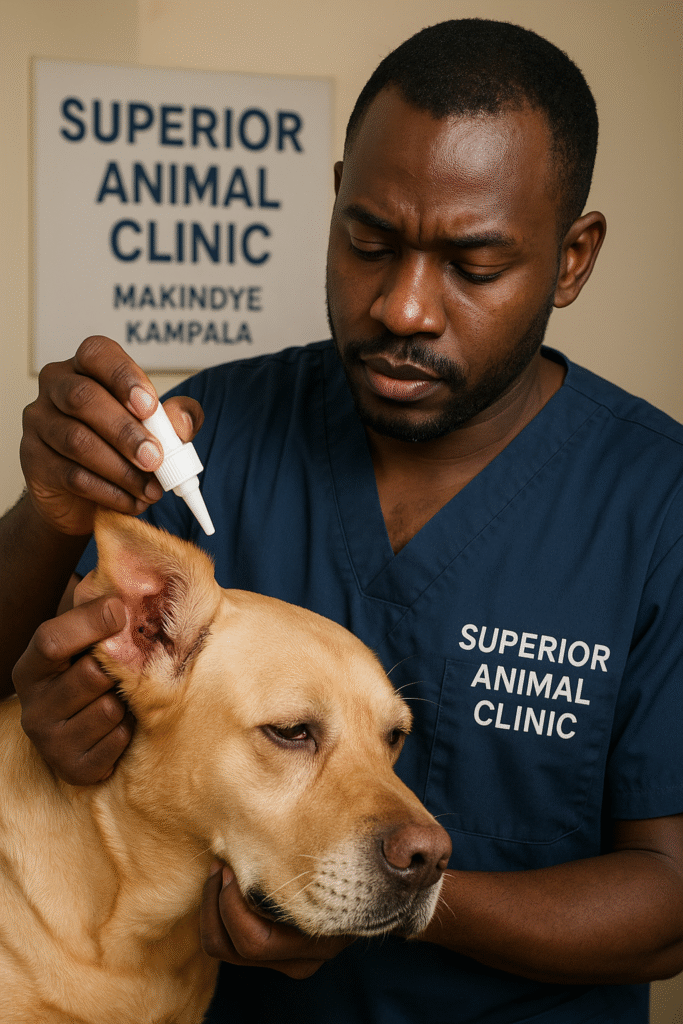
❓ FAQs About Dog Ear Infections in Uganda
1. What are the early signs of ear infection in dogs?
The first signs include head shaking, scratching the ears, redness, bad smell, and discharge. Some dogs tilt their heads or cry when touched. If you notice any of these, bring your dog to Superior Animal Clinic in Makindye immediately for a check-up before it worsens.
2. What causes ear infections in dogs in Uganda?
In Uganda, the most common causes include dust, moisture after bathing, ear mites, bacteria, yeast, and food allergies. The warm climate in areas like Makindye, Katwe, and Nsambya also encourages bacterial and fungal growth inside the ear canal.
3. How much does dog ear infection treatment cost in Kampala?
At Superior Animal Clinic, the cost depends on the cause and severity of the infection.
- Mild cases: simple cleaning and medication UGX 80,000 to 125000
- Moderate to severe cases: ear swabs, antibiotics, antifungal drops, and follow-up care UGX 125000 to 350,000
.
4. How much is the treatment of ear infection in Uganda?
The cost of ear infection treatment in Uganda varies depending on the type of infection and medications used. At Superior Animal Clinic, treatments are affordable and transparent, starting from basic ear cleaning to full treatment with antibiotics, antifungals, or anti-parasitics. Ranging from UGX 80,000 to 350,000
5. Who is the best vet for dog ear infection in Kampala?
The most trusted and experienced vet for dog ear infections in Kampala is Superior Animal Clinic, Makindye. Our veterinarians specialize in diagnosing, treating, and preventing ear infections, using modern equipment and safe, effective medications.
6. What is the best vet hospital for ear infection in Uganda?
For the best veterinary care for dog ear infections in Uganda, Superior Animal Clinic is highly recommended. We provide full ear infection treatment, preventive care, and follow-ups for dog owners in all neighborhoods of Kampala.
7. Can I treat a dog’s ear infection at home?
You can manage mild cases by gently cleaning your dog’s ears with a vet-approved cleaner and keeping them dry. However, avoid using home remedies without veterinary guidance — they can make the infection worse.
For safe and effective care, visit Superior Animal Clinic, where we identify the exact cause (bacteria, yeast, or mites) and prescribe the right medication.
8. How long does it take for a dog’s ear infection to heal?
With proper treatment from Superior Animal Clinic, most dogs recover within 7 to 14 days.
Chronic or deep ear infections may take 3 to 4 weeks of continuous care and follow-up cleaning.
9. What is the best ear cleaner for dogs in Uganda?
We recommend veterinary-grade ear cleaning solutions available at Superior Animal Clinic, specifically designed for Uganda’s warm and dusty conditions. These cleaners remove wax, dirt, and odor safely without irritating your dog’s ears.
10. Why does my dog keep getting ear infections repeatedly?
Recurring ear infections usually happen due to allergies, trapped moisture, ear mites, or incomplete treatment.
At Superior Animal Clinic, we run detailed tests to find the root cause and prevent future infections through routine cleaning, dietary changes, and parasite control.
11. Are ear infections contagious between dogs?
Yes — especially ear mite infections, which can easily spread between dogs (and even cats) in the same household. Always isolate infected pets and bring them to Superior Animal Clinic for proper treatment and follow-up.
12. Which dog breeds in Uganda are more prone to ear infections?
Floppy-eared and hairy breeds are at higher risk, such as Cocker Spaniels, Golden Retrievers, Labradors, Poodles, and German Shepherds. These breeds trap moisture and dirt easily.
If you own one of these dogs in Makindye, Muyenga, or Buziga, book regular ear check-ups at Superior Animal Clinic.
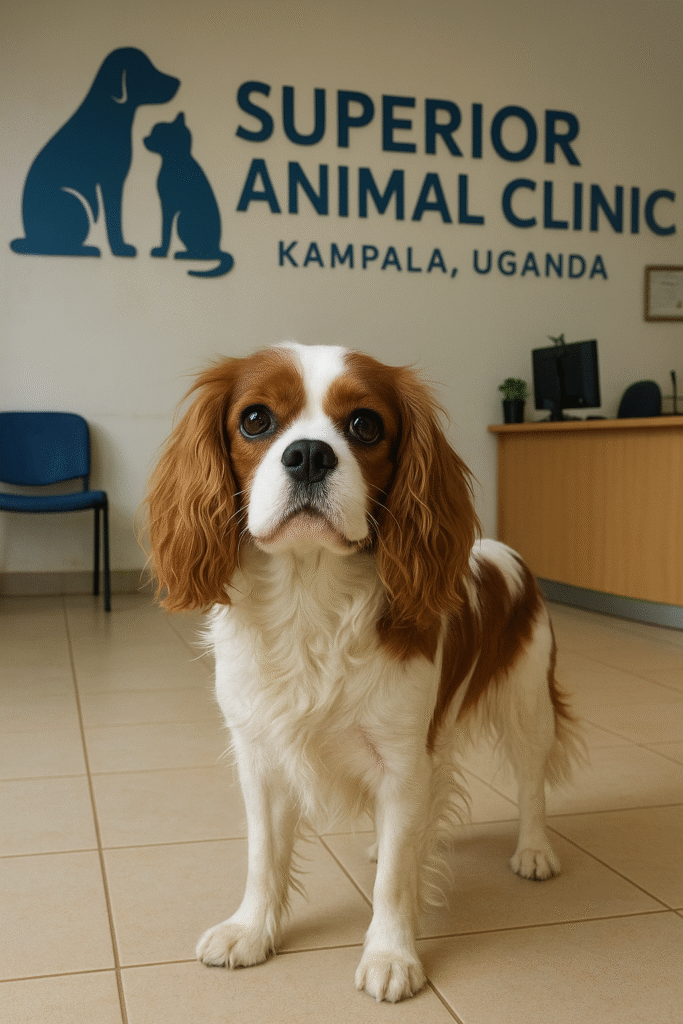
13. How can I prevent ear infections in my dog?
- Clean and dry ears regularly
- Keep ears dry after baths or swimming
- Control ear mites and ticks
- Feed a balanced, allergy-free diet
- Visit Superior Animal Clinic for monthly ear check-ups
This is especially important if you live in dusty or humid Kampala areas like Katwe, Nsambya, or Mutundwe.
14. Can ear infections cause hearing loss in dogs?
Yes. Untreated infections can spread deep into the ear canal, leading to permanent hearing loss, head tilting, and balance problems.
If your dog is shaking its head or seems off balance, visit Superior Animal Clinic immediately. Early treatment saves your dog’s hearing.
15. What home remedies can help a dog with an ear infection?
Some safe options (when approved by a vet) include:
- Diluted apple cider vinegar (for mild yeast infections)
- Coconut oil (for soothing inflammation)
- Warm saline rinse (for cleaning)
⚠️ Always confirm with a Superior Animal Clinic veterinarian before applying any home remedy — incorrect use can worsen the condition.
16. What foods should I avoid if my dog has ear infections?
Avoid feeding dairy, beef, or table leftovers — these often trigger allergic ear infections. Instead, switch to hypoallergenic diets or fish-based feeds available at Superior Animal Clinic.
17. Do humid or dusty areas in Kampala increase ear infection risk?
Yes. Areas like Makindye, Katwe, Lubaga, and Nsambya have high humidity or dust, which increases the risk of bacterial and yeast infections. Dogs living in Munyonyo or Buziga may also get ear infections from swimming in Lake Victoria.
18. When should I see a vet for my dog’s ear infection?
See a vet immediately if your dog shows:
- Head shaking or scratching
- Redness or swelling in the ear
- Bad smell or discharge
- Crying when you touch the ear
Superior Animal Clinic in Makindye is open daily to help your dog get fast relief and proper treatment.
19. What is the best treatment for ear infection in dogs in Uganda?
The best treatment depends on the cause:
- Bacterial infections: Antibiotic ear drops (Gentamicin, Enrofloxacin)
- Yeast infections: Antifungal drops (Clotrimazole, Miconazole)
- Ear mites: Anti-parasitic medication (Selamectin, Ivermectin)
All these treatments are available at Superior Animal Clinic, along with professional ear cleaning and follow-up checks.
20. How often should I clean my dog’s ears in Uganda?
For most dogs, clean ears once every 1–2 weeks.
For floppy-eared breeds or dogs living in dusty areas like Katwe or Kasubi, clean weekly and schedule monthly ear check-ups at Superior Animal Clinic to prevent buildup and infection.
21. What happens if I don’t treat my dog’s ear infection?
Ignoring an ear infection can lead to:
- Chronic pain and inflammation
- Permanent hearing loss
- Brain infection (in severe cases)
- Behavioral changes due to pain
Early treatment at Superior Animal Clinic prevents complications and ensures quick recovery.
22. Can weather changes cause ear infections in dogs?
Yes. Uganda’s rainy seasons increase humidity, while dry seasons increase dust — both can irritate your dog’s ears. Regular ear cleaning and vet visits at Superior Animal Clinic help prevent seasonal flare-ups.
23. Where can I get the best vet for dog ear infection in Kampala?
The best veterinary clinic for dog ear infection treatment in Kampala is Superior Animal Clinic, located in Makindye along Salaama Road.
We provide expert care, affordable treatment, and personalized prevention plans for dog owners across Ntinda, Nakasero, Muyenga, Buziga, Munyonyo, Nakawa, Rubaga, Lubowa, Seguku, Kololo, and the entire Kampala region.
🐕 Why Choose Superior Animal Clinic for Dog Ear Infection Treatment in Kampala?
- ✅ Expert veterinarians experienced in ear disease treatment
- ✅ Affordable and personalized care
- ✅ Advanced diagnostic and cleaning tools
- ✅ Located conveniently in Makindye along Salaama Road
- ✅ Trusted by pet owners from all Kampala neighborhoods
At Superior Animal Clinic, we treat your dog with love, care, and professionalism—just like family.
If your dog is shaking its head, scratching its ears, or showing signs of discomfort, don’t wait—visit Superior Animal Clinic in Makindye today.
📍 Location: Makindye, along Salaama Road, Kampala, Uganda
📞 Call/WhatsApp: +256 771909946
🐾 Superior Animal Clinic – Your Dog’s Health, Our Priority!
